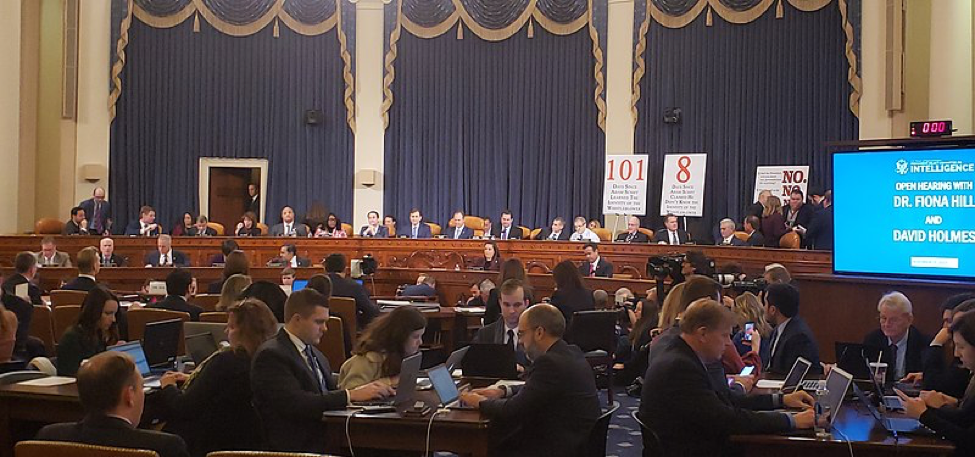In the latest Trump “scandal,” a whistle blower’s complaint has triggered an impeachment inquiry by the House Intelligence Committee. These hearings have drawn attention to a broader problem: The Trump administration’s belief in Russian-propagated conspiracy theories. Trump’s belief in these demonstrably fictional narratives poses risks to both US security and its democratic political processes.
On such narrative consists of the belief that Ukraine coordinated the DNC hack during the 2016 presidential election in an attempt to frame the Russians. These rumors advocate that CrowdStrike, a private US security firm hired in 2016 by the DNC to investigate the origins of this hack, was actually a Ukrainian-controlled company. The fact that CrowdStrike did not hand over the DNC’s physical server to the FBI, conspiracies abound that CrowdStrike concocted evidence to frame Russia for the hack in order to discredit President Trump’s 2016 presidential victory. However, prior to this hack, private emails from democratic leaders were released, and a wide range of cyber-security experts concluded that it was the work of Russian intelligence agencies through proxy groups known as COZY BEAR (APT 29) and FANCY BEAR (APT 28).
The Russian operation targeting the 2016 US presidential election is only the most prominent case of Russian political and informational warfare against the US Disinformation campaigns are a component of a long standing Russian strategy against the United States. Another well-known Russian operation, INFEKTION, sought to exploit international fears of US military expansion by sowing the narrative that AIDS had been created as the result of American biological weapons experimentation. While this narrative was false, it spread quickly. It lost traction only when the United States responded with threats of cutting cooperation with the USSR in regard to AIDS research.
On November 21st, 2019, the final day of testimony, the House brought former National Security Council Russia advisor Dr. Fiona Hill before the Intelligence committee, to offer her testimony. Dr. Hill, a British-born US national security expert with a Ph.D. from Harvard in Russian history, served in the Trump administration from April 2017 until her resignation in July 2018. She focuses her testimony on this particular conspiracy theory. Hill explained that the Kremlin stood to benefit from the turmoil generated about Trump’s behavior with Ukrainian leaders. “This is a fictional narrative that has been perpetrated and propagated by the Russian security services themselves. The unfortunate truth is that Russia was the foreign power that systematically attacked our democratic institutions in 2016.”
Hill’s testimony reaffirmed reports from the US intelligence community. A report by the CIA, NSA, FBI, and director of national intelligence called, “Assessing Russian Activities and Intentions in Recent US Elections,” explained Russia’s unprecedented efforts in the 2016 election was an attempt to create mistrust between Americans, the federal government and elected officials, while also undermining American democracy. Robert Mueller, former special counsel, and his team corroborated the intelligence community’s reports in his 448-page report. The Trump administration, however, has continued to contest these reports. Hill argued that the Kremlin is using Trump and his actions, deliberate or no, to serve Russian political goals.
These lies have gained traction in the media because the Trump Administration and the Republican party are popularizing the Russian disinformation campaign. The Russian government has carried out a multi-layered attack against the United States with an aim of amplify pre-existing divisions and of inciting conflict. The spreading of a discredited theory by highly respected government officials only undermines our security infrastructure. Leaders and lawmakers need to realize Russia is conducting informational warfare against the US, through the use of proxies, cyber-attacks, and disinformation. while the US stand by it is only aiding the Kremlin in their long-term goals of dominance over the United States.
The democratic political process functions when citizens trust their democratic institutions to represent their interests. The allegations against Trump assert the Commander in Chief of our country is willingly allowing Foreign influence to dismantle the US from within, fostering mistrust among citizens. The impact of disinformation campaigns continue long after ballot boxes close; these campaigns have lasting effects on democratic stability and voter trust.
The allegations made against President undermine our electoral processes and erode the essence of American democracy. While the impeachment hearings are specifically investigating allegations made by the whistle blower’s complaint, we must acknowledge a larger problem underlying the impeachment inquiry. Trump and his administration have been willing consumers and propagators of Russian propaganda, and the GOP’s continuing support of Trump’s endeavors is dangerous to American security and continuing democracy.
Voké Kalegha is a second-year graduate student, studying International Security at George Mason University’s Schar School of Policy and Government, with an emphasis on Intelligence. She is a 2018 graduate of Old Dominion University, where she earned her Bachelor’s degree – majoring in Criminal Justice and Communications, with a certificate in Cybersecurity.
Photo from Wikimedia Commons




